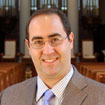Commentary on Zephaniah 1:7, 12-18
My wife and I attended a Scottish Episcopal church in St. Andrews, Scotland.
New to liturgical worship from our free-church background, we fell in love with the church’s liturgy during our time there. As one of my colleagues likes to say to liturgical detractors, “Which part don’t you like? The prayers part or the Scripture part?”
On one Sunday morning, the lectionary reading was a gospel reading where Jesus called the Pharisees a brood of vipers or some such stinging comment. It was a hard passage (as many in the Bible are) and left us again with the distinct impression that Jesus is not a tame lion. Then came the awkward liturgical moment after the reading. The lector said, “This is the word of the Lord.” And we responded nervously with, “Thanks be to God”…we think?
Zephaniah’s text is much like the judgment language we hear from Jesus in the gospels. “Repent for the kingdom of God is at hand.” “Be quiet,” says Zephaniah, “before the Lord God!” Why? “For the day of the Lord is at hand” (Zephaniah 1:17). Sermons that begin with “Be quiet!” tend to be remembered. This is how Zephaniah’s oracles in 1:7-18 begin. Zephaniah tells the people of God to be quiet, to hush (has). “Hush up, you’re in the presence of the Lord.” Thanks be to God?
The occasion is solemn and awe-inspiring. The image of the day of the Lord in Zephaniah is meant to strike fear in the hearts of God’s people. What may have been thought as a distant event in God’s eschatological plan is now about to break forth. It is imminent. Everything is ready. The sacrifice is prepared; the guests are ready. “The great day of the Lord is near, near and hastening fast” (1:14).
The appearing of the day of the Lord is accompanied with battle cries. “A warrior cries aloud there.” Who is this warrior crying out? It is Yahweh himself, charging into battle. Yahweh returns to Zion with wrath in his hands. The words of the prophet create a great sense of terror in the listeners. The sky may be calm, but the raging storms are brewing. When Yahweh returns to Zion, he will return as a judge. Psalm 98:9 says, “For he is coming to judge the earth. He will judge the world with righteousness, and the people with equity.” When Yahweh returns to Zion with his chariot kicking up sand in the eastern desert, he will do so as a judge making right the wrongs of his people and the nations.
The scene is apocalyptic. Distress, anguish, ruin, devastation, darkness, gloom: all of these are predicated on this day. The prophet’s arsenal of imagery is maxed out. The scene could not be worse. “Their blood shall be poured out like dust, and their flesh like dung” (1:17).
Why is the case? Nestled in verse seventeen is a causal clause revealing the reason for the coming onslaught. “Because they have sinned against the Lord.” In the Hebrew text, these six English words are half the size. It is a very small phrase. But its implications are enough to shake the very foundations of the world. “The whole earth shall be consumed” (1:18).
There are latent Marcionite tendencies in the church to this day. “I like Jesus but the God of the Old Testament is a crank!” This is certainly understandable from certain vantage points. But when Jesus shows up on the scene announcing the kingdom of God is at hand, the force of the statement is Zephaniah like. Karl Barth paints the scene well.1 Jesus arrives on the scene as a judge. He is Yahweh returning to Zion to bring judgment on his people and the nations: to make crooked valleys straight and rough places smooth. He enters the temple and cleanses it in a redemptive action that identifies him with God’s very self. He is the judge.
The surprising aspect of the gospel is what comes next. In a glorious moment of redemptive reversal, Jesus, who embodies Yahweh’s return to Zion and accompanying judgment, moves into the week of his passion. In an act of immeasurable grace, he then takes the judgment promised by Zephaniah onto himself. He becomes the Judge judged in our place on that Good Friday day of the Lord. When he does so, it shakes the earth to its very foundation.
Who is in this kingdom of Christ’s? The people Jesus identifies in his Sermon on the Mount as poor in spirit. Zephaniah says something similar: “Seek the Lord, all you humble of the land, who do his commands” (2:3). We have nothing to offer the coming Judge except for a relinquishing of our self-sufficiency and autonomy. The poor in spirit, the humble, see themselves as the thief at Christ’s cross who says in desperation, “Remember me when you come into your kingdom.” Members of Christ kingdom recognize the significance of their faith is located in faith’s object, not its quality. Members of Christ kingdom can say in honesty, “Nothing in my hands I bring; simply to your cross I cling.”
The day of the Lord announced in Zephaniah is frightful news. In Christ, however, it becomes good news for Christ’s church and the world.
This is the word of the Lord. Thanks be to God.
1Karl Barth, Church Dogmatics IV.1 (trans. G.W. Bromiley; Edinburgh: T&T Clark, 1956), 224-228.

November 13, 2011